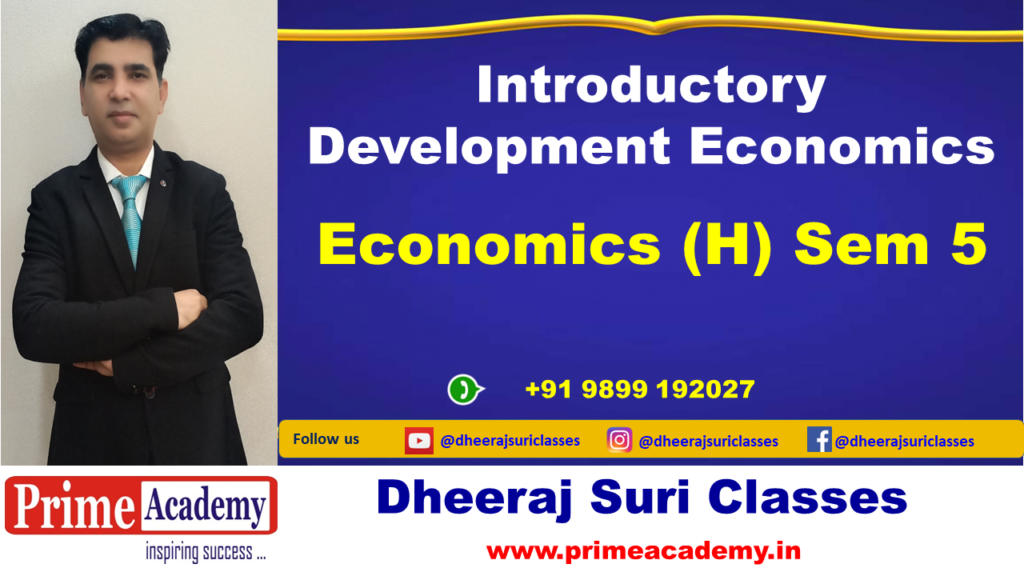Welcome to Prime Academy
We provide Best Online Coaching for Introductory Development Economics [ECON 015 for Economics (H) Semester V, University of Delhi
For getting access of recorded video lectures of
Introductory Development Economics [ECON 015] for Economics (H) Semester V
you need to subscribe our course.
If you are not registered at our website then Register Here
(After registration please inform us at +91 9899 192027 to get the access)
If you are already registered and have Got the access then Login to watch the Lectures
Reading List of Introductory Development Economics
The Introductory Development Economics [ECON 015] Course for BA (Hons) Economics Semester V, Delhi University has been taught by Mr. Dheeraj Suri. The Video Lectures are based upon the books prescribed by the University of Delhi. The Duration of Video Lectures is approximately 55 Hours.
Access of Video Lectures is provided on any one of the following devices:
Windows Computer or Laptop, or
Android Phone or Tablet, or
Apple Iphone or Ipad, or
Apple Macbook,
till end of Semester V Exams.
Course Fee : Rs. 7000
Fee Structure :
| Single Device | Two Devices | |
|---|---|---|
| Single Subject | Rs. 7000 | Rs. 12,000 |
| Two Subjects | Rs. 13,500 | Rs. 23,000 |
| Three Subjects | Rs. 20,000 | Rs. 33,000 |
| Four Subjects | Rs. 26,000 | Rs. 42,000 |
Once You get the access you need to login and download our APP and all the lectures from your login account and play in your device.
You will get :
►Full Course Video Lectures
►Video Lectures Cover Theory Portions Exhaustively + Complete Solutions of Back Questions of Readings + Solutions of Previous Years Papers + Large Number of Numericals
►Complete Study Material (PDF Notes) which includes Concepts, Previous Year Questions, Numerical Questions, MCQ’s and Important Questions
►Live Online Doubts Sessions with Expert Faculty (at least twice a week) for resolution of Doubts
►Online Discussion Forum to Post Your Queries to Discuss with Faculty & other fellow Students
►Mock Tests at the Website for regular assessment and progress tracking
►Comprehensive Coverage of Syllabus and Exam Oriented Preperation
This online coaching platform aims to provide a supportive and engaging learning environment for students to achieve academic success and excel in their Economics Honours program.
Demo Lectures for Introductory Development Economics
Course Introduction
Chapter 1 : Introducing Economic Development
Numericalss
These Lectures are Only for Demo.
For Complete Course Video Lectures You Need to Subscribe Our Course
Contact us at +91 9899192027 for details
Demo Quiz
For Complete Mock Test Series of Introductory Development Economics, You need to subscribe our course.
Contact us at +91 9899192027
Demo PDF Notes
Demo PDF of Study Material for Introductory Development Economics
Chapter-1-Introducing-Economic-DevelopmentClick Here to Download Demo PDF of Study Material
For Complete PDF Notes of Introductory Development Economics
Contact us at +91 9899192027
Exam Pattern
The Question Paper will be of 90 Marks
►30 Marks for Internal Assessment
►40 Marks for Continuos Assessment
►90 Marks for End Term Theory Examination
►[8 questions shall be asked, out of which any 5 (of 18 marks each) shall have to be attempted by the students]
Course Content of our Video Lectures
Lectures are Strictly as per Latest Syllabus for UGCF 2024
Unit I : Introducing Economic Development : Global Perspective
Chapter 1 : Introducing Economic Development
Number Video Lectures : 2
Duration of Video Lectures : 51 Minutes
Based Upon Chapter 1 Todro M.P. & Smith S. C.
Topics Covered
►Introduction to Some of World’s Biggest Questions,
►How Living Levels Differ Around the World,
►How Countries are Classified by their Average Levels of Development,
►Economics & Development Studies,
►The Meaning of Development,
►Happiness & Development,
►The Sustainable Development Goals,
Chapter 2 : Comparative Economic Development
Number Video Lectures : 2
Duration of Video Lectures : 51 Minutes
Based Upon Chapter 2 Todro M.P. & Smith S. C.
Topics Covered
►Developing Countries,
►Conventional Comparisons of Average National Income,
►Adjusting for Purchasing Power Parity,
►Other Common Country Classifications,
►Comparing Countries by Health & Education Levels,
►Human Development Index,
►Inequality & Absolute Poverty,
►Population Growth & Age Structure,
►Social Fractionalism, Level of Industrialisation, Natural Resource Endowments, Financial & Other Market Development,
►Quality of Institutions & External Dependence,
►Convergence of Developed & Developing Nations,
►Long Run Causes of Comparative Development,
Chapter 3 : Human Development Index
Number Video Lectures : 1
Duration of Video Lectures : 8 Minutes
Based Upon HDI Report 2016 Technical Note 1
Topics Covered
►Creating Dimension Indices,
►Computing HDI,
Unit II : Theories of Economic Development
Chapter 4 : Classic Theories of Economic Growth & Development
Number Video Lectures : 2
Duration of Video Lectures : 51 Minutes
Based Upon Chapter 3 Todro M.P. & Smith S. C.
Topics Covered
►The Linear Stages Theories,
►Rostow’s Stages of Growth, The Harrod Domar Growth Model,
►Structural Changes Models, The Lewis Theory of Economic Development, Criticisms of the Lewis Model,
►Structural Change & Patterns of Development,
►The International Dependence Revolution, The Neocolonial Dependence Model, The False Paradigm Model, The Dualistic Development Thesis,
►The NeoClassical Counter Revolution, public Choice Theory, Market Friendly Approach,
►The Solow NeoClassical Growth Model,
Unit III : The Strategy of Economic Development : Institutional Pathways
Chapter 5 : Problems of Capital Formation in Underdeveloped Countries
Number Video Lectures : 2
Duration of Video Lectures : 51 Minutes
Based Upon Nurkse Ragnar
Topics Covered
►The Size of the Market and the Inducement to Invest,
►The Theory of Development and the Idea of Balanced Growth,
►Determinants of the Size of the Market,
►Structural Change & Patterns of Development,
►Determinants of the Size the Market,
►Balanced Growth & International Specialisation,
►The Traditional Pattern of Foreign Investment,
Chapter 6 : Linkages in Economic Development
Number Video Lectures : 3
Duration of Video Lectures : 74 Minutes
Based Upon Chapter 3 Albert O. Hirschman
Topics Covered
►Meaning of Linkages,
►Backward & Forward Linkages,
►Stimulus for Linkages,
►Linkages & Input Output Matrix,
►Linkages & Industrialisation,
►Criticism of Import Substituting Industrialisation,
Chapter 7 : Strategies for Economic Development
Number Video Lectures : 3
Duration of Video Lectures : 70 Minutes
Based Upon Chapter 6 Amitva Krishna Dutt
Topics Covered
►Development of Education and Human Capital,
►Upgrading the Infrastructure,
►Promoting Innovation and Technological Advancement,
►Inclusive Growth and Social Welfare,
►Suatainable Development,
Unit IV : Poverty and Inequality
Chapter 8 : Poverty as Capability Deprivation
Number Video Lectures : 2
Duration of Video Lectures : 115 Minutes
Based Upon Chapter 4 Amartya Sen
Topics Covered
►Poverty as Capability Deprivation,
►Income Poverty and Capability Poverty,
►Inequality,
►Unemployment & Capability Deprivation,
►Health Care and Mortality,
►Poverty & Deprivation in India & Subsaharn Africa,
►Gender Inequality & Missing Women,
Chapter 9 : Economic Inequality
Number Video Lectures : 5
Duration of Video Lectures : 198 Minutes
Based Upon Chapter 6 Debraj Ray
Topics Covered
►Meaning of Economic Inequality,
►Measuring of Economic Inequality,
►Four Criteria for Inequality Measurement, Anonymity Principle, Population Principle, Relative Income Principle and Dalton Principle,
►Lorenz Curve,
►Range, The Kuznets Ratios, Mean Absolute Devation, Standard Deviation and Gini Coefficient,
Chapter 10 : Poverty & Undernutrition
Number Video Lectures : 4
Duration of Video Lectures : 190 Minutes
Based Upon Chapter 8 Debraj Ray
Topics Covered
►Meaning of Poverty, Absolute or Relative Poverty, Temporary or Chronic Poverty,
►Poverty Measures, Head Count Ratio, Poverty Gap Ratio, Income Gap Ratio,
►Poverty Empirical Observations,
►The Functional Impact of Poverty, Poverty Credit and Insurance,
►Poverty, Credit and Insurance,
►Poverty, Nutrition and Labour Markets, Nutrition and Work Capacity,
►The Unequal Sharing of Poverty,
On Payment of Fee we will create your account on our website & you need to login and download all the lectures & our APP through that login account
Payment Details
To purchase any course you need to transfer the amount either through Google Pay or PhonePe at 9811261671 or Paytm at 9899192027 or Transfer through net banking IMPS into the following account
Account Details
Dheeraj Suri
Saving Account Number
392010100053871
Axis Bank, Model Town Branch
Delhi – 110009
IFS Code : UTIB0000392
Payment App Details
GPay Number : +91 9811261671
PhonePe Number : +91 9811261671
Paytm Number : 9899192027
After transfer update us with payment details through Whatsapp at +91 9899192027
Economics (H) Semester V [ UGCF 2024 ]
Video Lectures, PDF Notes, Mock Tests & Live Doubt Sessions are offered for the following Subjects for BA (Hons) Economics Semester V, Delhi University
Discipline Specific Core Papers
►Game Theory & Strategic Interactions (ECON 013)
►Economic Growth & Business Cycles (ECON 014)
►Introductory Deevlopment Economics (ECON 015)
Discipline Specific Elective (DSE) Papers
►Advanced Econometrics (ECON 036)
►Environmental Economics (ECON 039)
►Law & Economics (ECON 041)
►Open Economy Macroeconomics (ECON 042)
►Public Economics (ECON 045)
►Modern Political Economy (ECON 043)
Generic Elective (GE) Papers
►Theory of Public Finance (ECON 061)
►Money & Banking (ECON 062)
►Introduction to Comparative Economic Development (ECON 064)
►Principles of Microeconomics – II (ECON 027)
►Corporate Finance, Governance & Development (ECON 067)

